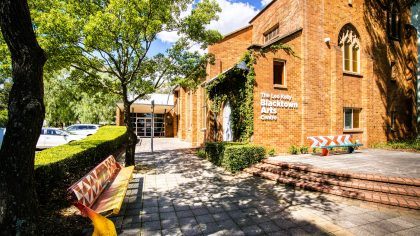
The Leo Kelly Blacktown Arts Centre
An innovative multi-arts hub in the heart of Blacktown City.
Bayadyinyang budyari Dharug yiyura Dharug Ngurra.
Bayady’u budyari Dharug Warunggadgu baranyiin barribugu.
Bayady’u budyari wagulgu yiyuragu Ngurra bimalgu Blacktown City. Flannel flowers dyurali bulbuwul.
Yanmannyang mudayi Dharug Ngurrawa. Walama ngyini budbud dali Dharug Ngurra Dharug yiyura baranyiin barribugu.
We acknowledge the Traditional Custodians of this Land, the Dharug people, and their continued connection to Country.
We pay our respects to Elders from yesterday to tomorrow.
We extend that respect to all Aboriginal and Torres Strait Islander Peoples of Blacktown City where the flannel flowers still grow proud and strong.
We will walk softly on this land and open our hearts to Country as the Dharug people have for tens of thousands of years.
Credit to: Dharug woman Rhiannon Wright, daughter of Leanne ‘Mulgo’ Watson Redpath and granddaughter of Aunty Edna Watson

The Leo Kelly Blacktown Arts Centre is bringing an internationally-acclaimed performance event to Blacktown this September. Truth to Power Café is a theatrical reflection on loss, hope and resistance. It is a unique and online meditation on time, place, and community, as local participants speak passionately to the truth of their lived experience in response to the question ‘who has power over you and what do you want to say to them?’
Blacktown Arts producer Louisa Minutillo sat down with Jeremy to talk about his artistic practice, the journey to creating Truth to Power Café and why the Blacktown program will be so powerful.
How would you describe yourself as an artist?
Before I made Truth to Power Cafe, I had spent 25 years as a contemporary theatre producer. I set up London Artists Projects in 2002 and before that I was a founding member of ACT UP (Aids Coalition to Unleash Power). Through my theatre work and community activism, I’ve been able to champion and develop platforms for underrepresented voices and new forms of artistic and political expression.
Put simply I’m a humanist theatre-maker and a by-product of my lifelong relationships and lived experiences, be they political, personal or professional. These are the things which have made me who I am, and continue to inform my work to this day.
Tell us a little bit about the journey to make Truth to Power Café the success it is today.
When I was growing up I had a very difficult time with my father to the point that we were estranged when he died. His death triggered a rigorous enquiry into our fractured relationship, during which I learnt a lot about myself, the nature of power and occupation of the mind, and the importance of truth and reconciliation.
It was that inquiry that sparked Truth to Power Cafe, which takes the form of a 60-minute performance event combining memoir, image, poetry, music and live testimony from participants rising up in response to the question ‘who has power over you and what do you want to say to them?’
I’m also cast as a participant. I talk of the power my father had over me when he was alive. He was a member of the Hackney Gang – a group of six friends that included the Nobel Prize winning Playwright Harold Pinter, and the actor and poet Henry Woolf, with whom I’ve co-created the show directed by Jen Heyes. For sixty years the Hackney Gang maintained their belief in speaking truth to power and remained firmly on the side of the disempowered, the occupied and their allies. It is these people we invite to take part in the show.
What impact has touring Truth to Power Café had on you, both personally and creatively?
Truth to Power Cafe is the first show to emerge from a complicated yet ultimately rewarding and organic journey. The journey included the death of my father which resulted in a major life change, during which I found myself transitioning from producer to artist and performer. Around the same time I was diagnosed with a stage 4 lymphoma and underwent a stem cell transplant.
Sarah Schulman, author of the celebrated AIDS memoir The Gentrification of the Mind and Let the Record Show has described Truth to Power Cafe as an example of “conscious transformation of history into opportunity”. I can’t argue with that.
What advice would you give to artists about turning ideas into reality?
Being an artist gives you an enormous amount of freedom to be yourself. With that comes responsibility and degrees of pressure, so I think it’s important to take care of your wellbeing.
In my own case I was able to fall back on my skills and contacts as a theatre producer, without which I don’t think I would have been able to make Truth to Power Cafe. I say this because I’m 51 in an ageist industry obsessed with youth and emerging arts. People forget you can emerge at any age.
What do you think is powerful about Blacktown, and what are you excited to find out more about through the project?
I’ve been reading up a lot about Blacktown and its proud Darug history and community.
As we emerge from this latest lockdown, telling true and untold stories about our lives is more important than ever. Through the telling of these stories, we can capture Blacktown’s progressive energy and use it as a catalyst for change and renewal in the connected space of theatre.
This is a chance to claim agency over ourselves and our community, and to do this, in the eyes of family, friends and allies, is what makes the show so empowering.
At a time when there can be no return to normal, we demand that you listen.